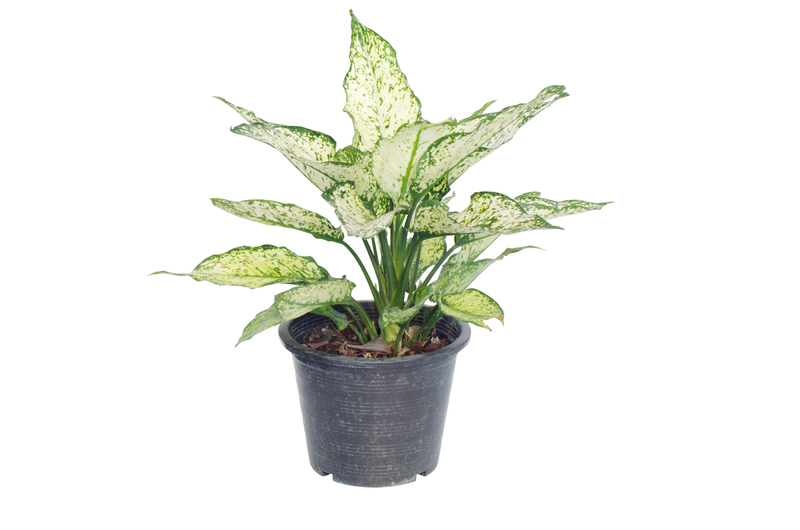Organic Waste: The Key to Soil Vitality
Posted on 17/09/2025
Organic Waste: The Key to Soil Vitality
In the contemporary world, where sustainable agriculture and environmental conservation are of utmost importance, organic waste emerges as a critical resource for maintaining and enhancing soil health. By examining what constitutes organic waste, its benefits, management techniques, and its irreplaceable role in restoring depleted soils, this comprehensive guide aims to shed light on how harnessing organic waste can be the keystone for soil vitality and long-lasting ecosystem balance.
Understanding Organic Waste and Its Types
Organic waste refers to any material that is biodegradable and comes from either a plant or animal. It is often known as biodegradable waste and comprises materials like food scraps, garden trimmings, manure, and agricultural residues. These types of waste are natural, renewable, and--crucially--can be recycled back into the earth to improve soil quality. Organic waste is distinguished from inorganic forms of waste due to its capacity to decompose, enriching soils with vital nutrients and organic matter.
Main Types of Organic Waste
- Food Waste: Leftovers, peels, and expired products from households and restaurants.
- Yard Waste: Leaves, grass clippings, branches, and plant trimmings.
- Animal Waste: Manure from livestock, poultry bedding, and other farm-generated organic matter.
- Agricultural Residues: Crop stalks, husks, shells, and other by-products following harvest.
- Industrial Organic Waste: Waste from food processing, breweries, and paper mills.
Each of these waste streams contains essential nutrients like nitrogen, phosphorus, and potassium, which are crucial for plant growth and soil rejuvenation.

The Science Behind Organic Waste and Soil Health
When incorporated into soil, organic matter derived from organic waste undergoes decomposition through the activity of microbes such as bacteria and fungi. This natural breakdown process results in the release of nutrients and the formation of humus, fostering a healthy soil structure. This transformation enriches the soil's organic content, creating a vibrant biological environment where plants thrive.
How Organic Waste Enhances Soil Properties
- Increases Soil Fertility: Decomposing organic materials release vital nutrients, boosting nutrient availability for crops.
- Improves Soil Structure: Humus formed from organic matter binds soil particles together, promoting better aeration and water retention.
- Encourages Microbial Activity: Organic waste fuels microbial populations, which are essential for nutrient cycling and disease suppression.
- Enhances Moisture Retention: Soils rich in organic matter absorb and hold more water, reducing irrigation needs and drought impact.
- Reduces Soil Erosion: Improved structure and plant cover help prevent wind and water erosion.
With these undeniable benefits, it is clear that organic waste management is fundamental to sustaining and regenerating soil quality.
Composting: Transforming Waste into Nutrient Gold
One of the most practical and eco-friendly ways to repurpose organic waste is through composting. Composting is a controlled biological process where organic waste is decomposed by microorganisms in the presence of oxygen. This transformation creates a rich, dark material known as compost, which serves as a powerful soil conditioner.
Benefits of Composting Organic Waste
- Reduces Landfill Load: Composting diverts significant portions of household and agricultural waste away from landfills, lowering methane emissions and environmental pollution.
- Enhances Soil Vitality: The nutrients and beneficial microbes present in compost enrich soil and promote resilient plant growth.
- Suppresses Plant Diseases: Well-composted organic matter contains microorganisms that outcompete harmful pathogens, keeping plants healthier.
- Cost Savings: Compost reduces reliance on chemical fertilizers and amendments, making it an economically viable option for farmers and gardeners.
- Fosters Sustainable Agriculture: Increased compost use supports organic farming methods and closes the nutrient loop.
*Key takeaway: Composting transforms potential waste into a resource that reinforces soil vitality and advances sustainable soil management.*
Organic Waste Recycling: Beyond Traditional Composting
While composting remains the most accessible method, innovative practices such as vermicomposting, biochar production, and anaerobic digestion offer new ways to maximize the value of organic waste for soil health.
Vermicomposting (Worm Composting)
* Vermicomposting leverages earthworms to accelerate the breakdown of food scraps and other organic materials. The worm castings produced are richer in nutrients and beneficial microbes than traditional compost, making them highly effective as a soil amendment.
Biochar
* Biochar is a form of charcoal made by pyrolyzing organic waste under low-oxygen conditions. It is prized for enhancing soil's nutrient-holding capacity, improving water management, and sequestering carbon, helping mitigate climate change.
Anaerobic Digestion
* In this process, organic waste is broken down without oxygen, resulting in biogas and digestate. The digestate can be applied to land as a nutrient-rich fertilizer while also generating renewable energy for on-farm or community use.
These advanced recycling methods reinforce the philosophy that no organic waste should go unused--especially when soil improvement and environmental sustainability are at stake.
The Environmental Impact of Organic Waste Management
Discarding organic matter in landfills causes more harm than good. When buried under layers of non-biodegradable trash, organic waste decomposes anaerobically, producing methane--a potent greenhouse gas. Furthermore, the loss of biodegradable resources from the soil system disrupts natural nutrient cycling and diminishes soil fertility over time.
Benefits of Diverting Organic Waste away from Landfills
- Lower Greenhouse Gas Emissions: Properly managed compost emits negligible amounts of greenhouse gases compared to anaerobic decomposition in landfills.
- Reduced Need for Chemical Fertilizers: By recycling essential nutrients, organic waste lessens dependency on synthetic inputs, fostering a healthier, more balanced soil ecosystem.
- Restoration of Soil Health: Long-term application of organic amendments reverses soil degradation and rehabilitates eroded or compacted landscapes.
- Cleaner Communities: Composting and recycling initiatives reduce waste collection frequency and minimize foul odors in urban environments.
Effective organic waste management thus stands as not only an agricultural necessity but also an environmental and public health imperative.
Practical Steps for Utilizing Organic Waste to Improve Soil
Individuals, communities, and farmers can all contribute to improved soil health through responsible organic waste management. Below is a step-by-step outline for starting with organic waste recycling for soil enrichment:
Step 1: Separation of Organic Material
Households and institutions should separate kitchen scraps, yard waste, and other biodegradable items from plastics, metals, and hazardous wastes. A dedicated container for organic waste helps simplify this process.
Step 2: Selecting the Right Recycling Method
- Composting: Suitable for most garden and food waste.
- Vermicomposting: Ideal for indoor spaces or those seeking premium, nutrient-dense amendments.
- Community-Scale Anaerobic Digestion: Effective for villages, institutions, and agribusinesses with large quantities of organic by-products.
Step 3: Proper Management for Safe, High-Quality Output
- Balance Carbon and Nitrogen: Combine "greens" (fresh, moist materials) and "browns" (dry, woody materials) for efficient decomposition.
- Monitor Moisture and Aeration: Ensure compost piles remain damp, and turn regularly to provide oxygen.
- Prevent Contamination: Avoid adding meat, dairy, diseased plants, and non-biodegradable materials.
Step 4: Applying Finished Organic Amendments
After several weeks to months, finished compost or vermicompost can be applied to garden beds, crop fields, potted plants, and lawns. Even a thin layer improves soil structure, nutrient density, and the ability to retain moisture.
Case Studies: The Power of Organic Waste for Soil Vitality
Urban Gardening Initiatives
Cities like San Francisco and Toronto have introduced mandatory organic waste collection and composting programs. These initiatives close the nutrient loop by returning valuable organic matter to urban gardens and parks, resulting in more robust greenery, higher urban yields, and reduced waste disposal costs.
Regenerative Agriculture Movements
Across the globe, farmers have shifted to organic and regenerative farming systems that prioritize compost, green manures, and cover crops. Soil organic matter content rises, water retention improves, and yields remain stable even under stressful conditions--demonstrating that returning organic waste to soils is vital for resilience and productivity.
Developing Countries and Food Security
In regions where soil degradation is rampant and access to chemical inputs is limited, local composting initiatives boost harvests and improve crop nutrition. This not only ensures food security but also regenerates the land for future generations--a testament to the timeless wisdom of organic soil enrichment.

Future Perspectives: Embracing Organic Waste as a Global Resource
Innovative policies and grassroots actions are increasingly seeing organic waste not as a problem, but as a solution. By investing in better separation, collection, and processing infrastructure, and providing farmers and urban dwellers with the knowledge to compost and recycle, societies can transform seemingly useless materials into a renewable foundation for food production and ecological resilience.
Emerging research highlights the long-term benefits of increasing soil organic matter levels: improved yields, consistent water availability, enhanced biodiversity, resilience against pests, and even carbon sequestration to combat global warming.
Integrating Organic Waste Into Circular Economies
The circular economy vision places organic waste recycling at its center, where agricultural residues, food scraps, and other biodegradable items are perpetually reintegrated into food systems. This cycle minimizes waste while maximizing soil vitality and environmental health.
Conclusion: Organic Waste--A Pillar of Soil Vitality
Ensuring soil vitality for future generations requires rethinking our relationship with waste. Rather than viewing organic materials as disposable, we can embrace them as the key to restoring the life in our soils. From home composting bins to large-scale regenerative farms, every effort to recycle organic waste brings us closer to thriving, nutrient-rich soils and a healthier planet. By adopting these practices widely, we can safeguard our food supply, protect the environment, and nurture resilient communities--all through the wise stewardship of organic resources.
Organic waste truly is the key to soil vitality--let's unlock its full potential, for people and the planet!
Latest Posts
Garden Ideas for Hours of Kid-Friendly Fun
Explore nine hedge options for rapid privacy enhancement
Design a Peaceful Escape with Zen Garden Concepts



